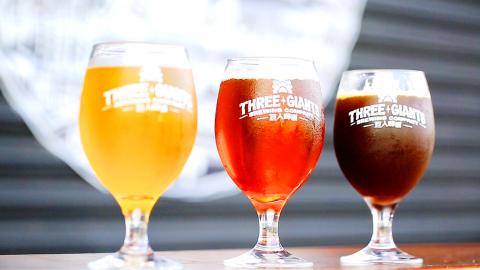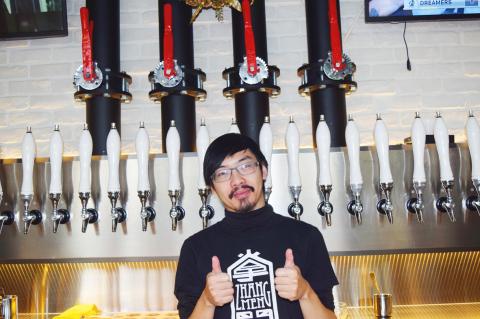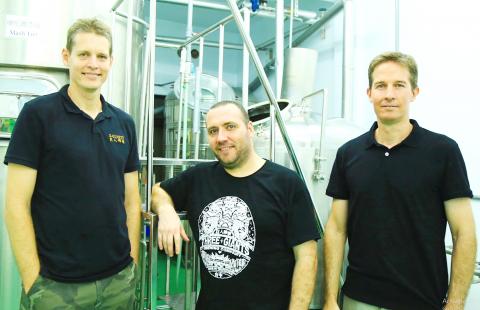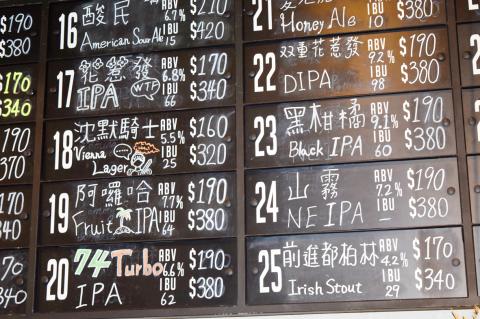If it’s Wednesday night you’re likely to find Arlan Bonwick saddled up to the bar with his usual after work meal: barbecue chicken wings and a locally-brewed pale ale the color of the sunset.
“I like drinking craft-brewed beer,” said Bonwick, a regular at Delicatesses Desmarais in Taichung. “It’s got a really unique flavor.”
Customers such as Bonwick are exactly what local brewers are hoping for in Taichung’s burgeoning craft beer market.

Photo courtesy of Casper Willemse
Warning: Excessive consumption of alcohol can damage your health.
The source of Bonwick’s pale ale lies in Taichung’s Fengyuan District (豐原) at Three Giants Brewing Company. The small brewery produces five varieties of beer, mostly in keg form.
Compared to Taipei’s already booming craft beer market, Taichung has only recently emerged onto the scene.
MORE SUDS

Photo by John Evans
As craft beer consumption has risen, so too has the number of breweries. Up from just one a breweries. Up from just one a decade ago, there are currently four craft breweries operating in Taichung. And those in the industry expect that number to grow.
While sales of craft beer have taken off, the nation’s most popular beer by far is Taiwan Beer, produced by Taiwan Tobacco & Liquor Corp, which once had a monopoly on the industry.
“It’s still a niche market,” said Casper Willemse, co-owner of Three Giants brewery. “But to be a cool bar, you have to have craft beer on tap.”

Photo courtesy of Casper Willemse
What began with Willemse and two coworkers making homebrew in plastic tubs on a rooftop three years ago, has turned in an actual brewery. In less than a year since opening, Three Giants brewery supplies nearly 40 bars and restaurants nationwide, up from just a few businesses three months ago.
Willemse and his partners are hopeful that Taiwanese palates for craft beer will continue to expand. Optimistically, they point to the popularity of recent craft beer festivals where beer enthusiasts and brewers come together.
TAIWAN BEER

Photo by John Evans
The challenge, Willemse said, is how to entice long-time drinkers of Taiwan Beer and other lighter lagers to try their bolder, more flavorful beer.
“At first people come out of curiosity,” he said. “You have to slowly ween them off the lager and then show them the ale.”
To help with this transition, Three Giants Indian Pale Ale is less bitter than traditionally found, Willemse said.
“We try to tailor our beer to local tastes.”
“Long-term I can see the feeling is changing in Taiwan,” Willemse added.
As an example he points out the demand for high-end coffee, a national trend over the past decade.
BITTERNESS SCALE
At Zhang Men Brewing Company (掌門精釀啤酒) each beer is rated on a bitterness scale. For instance, a honey ale, low in bitterness, has a 10, while a double IPA has a 98. With 32 beers on tap, customers can sample beers of varying flavors, from fruity to hoppy.
“You work your way up to the stout,” said Oscar Lee (李奕德), an employee and beer aficionado at Taichung’s Zhang Men brewery, one of the company’s nine taprooms in the nation.
Lee’s advice to those new to drinking craft beer is to lose the ice, which is traditionally dropped into small glasses of lighter beers.
“I tell them if it’s too cold you can’t smell it,” said Lee, whose appreciation for craft beer started by making homebrew in college. “I’ve learned how to taste the differences in beer, like there is in whiskey.”
His other tip: “You don’t ganbei (drain the glass, 乾杯) craft beer.”
First-time customer Weng Shou-de (翁守德) listened to Lee’s advice on bitterness and alcohol content before ordering a beer flight, small samples of six varieties.
“We just wanted to try something new,” said Weng, who brought his family to the Zhang Men taproom.
It was the smoothness of the German wheat beer that caught Weng’s attention. Intrigued by the subtle differences in craft beers, Weng said he’d return to try other varieties.
HIPSTER BEER CULTURE
Aside from offering drinkers new options, craft beer has a certain hipness in Taiwanese culture.
“People treat craft beer like a cocktail,” said Brian Desmarais, whose deli has benefited from offering four kinds of Three Giants beer on tap. Since switching from European bottled beer to locally-brewed craft beer nine months ago he estimates his beer sales have doubled.
Beer drinkers want a distinct flavor, he added, and they patronize places that offer that product.
“Neighbors come in and try one, then come back with a friend,” Desmarais said. “It’s their treat for the week. They have a sandwich and a couple of lagers.”
Desmarais and others have welcomed the change in drinking culture from a few years ago when it was more common to see people drinking outside convenient stores.
But some wonder whether there are too many restaurants and bars jumping on the craft beer bandwagon.
“They need to attract more and more customers,” said Ray Huang (黃晁偉), who operates Wuller Homebrew Supply in Taichung County’s Wufeng District (霧峰).
While most glasses of craft beer are in the NT$150 range, some brands go for more than double that amount. Huang points to this high price as a hurdle for attracting younger customers.
“I really wish the price was cheaper,” Huang said.
As a way to enjoy craft beer, but at a lower cost, Huang said he would like to see more people making their own beer.
With a surge in craft beer sales in the last two years, most say the trend is here to stay.
“The industry is growing and everyone wants to get involved,” said Weng Yi-chung (翁詒君), owner of ChangeX Beer in Taichung, which offers 300 varieties of craft beer.
An early player in the city’s craft beer market, Weng said he anticipates larger businesses to push their way into the market.
Taking a philosophical approach to craft beer’s evolution from being obscure to stylish, Weng said, everything changes, even people’s appreciation for craft beer.

April 14 to April 20 In March 1947, Sising Katadrepan urged the government to drop the “high mountain people” (高山族) designation for Indigenous Taiwanese and refer to them as “Taiwan people” (台灣族). He considered the term derogatory, arguing that it made them sound like animals. The Taiwan Provincial Government agreed to stop using the term, stating that Indigenous Taiwanese suffered all sorts of discrimination and oppression under the Japanese and were forced to live in the mountains as outsiders to society. Now, under the new regime, they would be seen as equals, thus they should be henceforth

With over 100 works on display, this is Louise Bourgeois’ first solo show in Taiwan. Visitors are invited to traverse her world of love and hate, vengeance and acceptance, trauma and reconciliation. Dominating the entrance, the nine-foot-tall Crouching Spider (2003) greets visitors. The creature looms behind the glass facade, symbolic protector and gatekeeper to the intimate journey ahead. Bourgeois, best known for her giant spider sculptures, is one of the most influential artist of the twentieth century. Blending vulnerability and defiance through themes of sexuality, trauma and identity, her work reshaped the landscape of contemporary art with fearless honesty. “People are influenced by

The remains of this Japanese-era trail designed to protect the camphor industry make for a scenic day-hike, a fascinating overnight hike or a challenging multi-day adventure Maolin District (茂林) in Kaohsiung is well known for beautiful roadside scenery, waterfalls, the annual butterfly migration and indigenous culture. A lesser known but worthwhile destination here lies along the very top of the valley: the Liugui Security Path (六龜警備道). This relic of the Japanese era once isolated the Maolin valley from the outside world but now serves to draw tourists in. The path originally ran for about 50km, but not all of this trail is still easily walkable. The nicest section for a simple day hike is the heavily trafficked southern section above Maolin and Wanshan (萬山) villages. Remains of

Last week, the the National Immigration Agency (NIA) told the legislature that more than 10,000 naturalized Taiwanese citizens from the People’s Republic of China (PRC) risked having their citizenship revoked if they failed to provide proof that they had renounced their Chinese household registration within the next three months. Renunciation is required under the Act Governing Relations Between the People of the Taiwan Area and the Mainland Area (臺灣地區與大陸地區人民關係條例), as amended in 2004, though it was only a legal requirement after 2000. Prior to that, it had been only an administrative requirement since the Nationality Act (國籍法) was established in